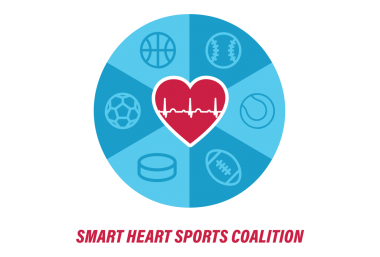We actively partner with national coalitions and alliances that share our goals. By joining forces with other organizations, we amplify our reach and drive progress in awareness, support, education, and prevention.
 Smart Hearts Sports Coalition
Smart Hearts Sports Coalition
In March 2023, the National Football League, along with other major sports organizations and leading patient and health advocacy groups, announced the formation of The Smart Heart Sports Coalition, to advocate for all 50 states to adopt evidence-based policies that will help prevent fatal outcomes from Sudden Cardiac Arrest (SCA) among high school students. The Sudden Cardiac Arrest Foundation is a member of the coalition.
A key initiative led by the coalition is the AEDs for Youth Program. This nationwide program – a collaboration among the coalition, Coro Medical, and Avive Solutions, Inc. – makes new automated external defibrillators (AEDs) available to public and private K-12 schools as well as youth sports organizations across the country at substantial discounts.
Visit the website to learn more about purchasing an "AED school bundle" or an "AED athletic bundle" that fits your specific needs.
 Genetic Cardiomyopathy Awareness Consortium (GCAC)
Genetic Cardiomyopathy Awareness Consortium (GCAC)
The Sudden Cardiac Arrest (SCA) Foundation is a member of the Genetic Cardiomyopathy Awareness Consortium (GCAC). This collaboration aims to enhance awareness and understanding of the genetic factors contributing to cardiomyopathy.
The SCA Foundation's mission is to prevent sudden cardiac arrest and save lives through education, advocacy, and research. By joining forces with GCAC, the foundation seeks to leverage GCAC's expertise in genetic cardiomyopathy to better inform SCAF constituents about the genetic risks associated with sudden cardiac arrest.
Sudden cardiac arrest can result from underlying heart conditions, many of which have genetic components. Cardiomyopathy, a disease of the heart muscle, is one such condition that can lead to sudden cardiac arrest. Nearly 50% of cardiomyopathy cases in the United States are inherited. Despite this high prevalence, only a small percentage of patients undergo genetic testing. Early genetic testing and diagnosis can significantly improve the management and treatment of cardiomyopathy, potentially mitigating risk for sudden cardiac arrest.
For more information, visit Genetic Cardiomyopathy Awareness Consortium.
